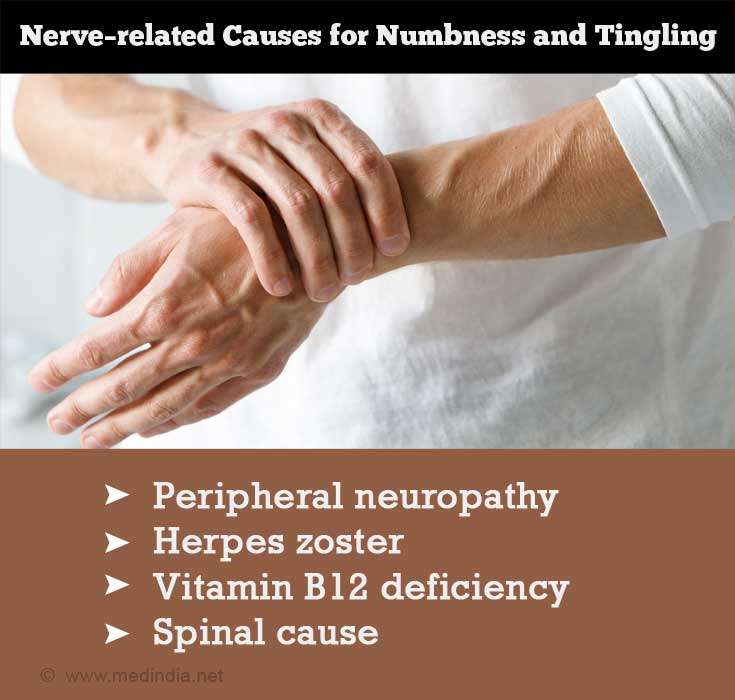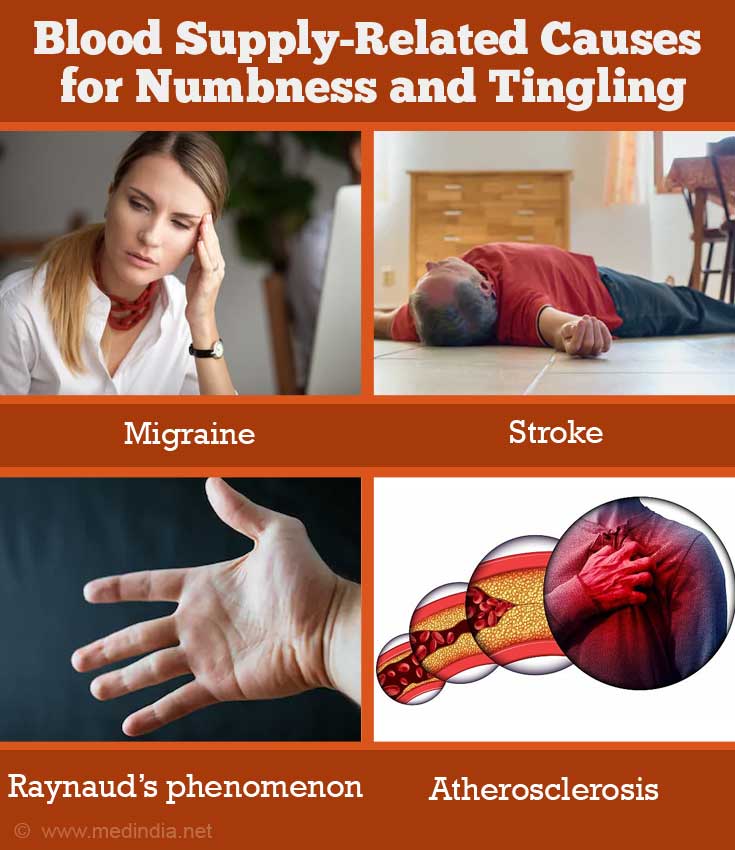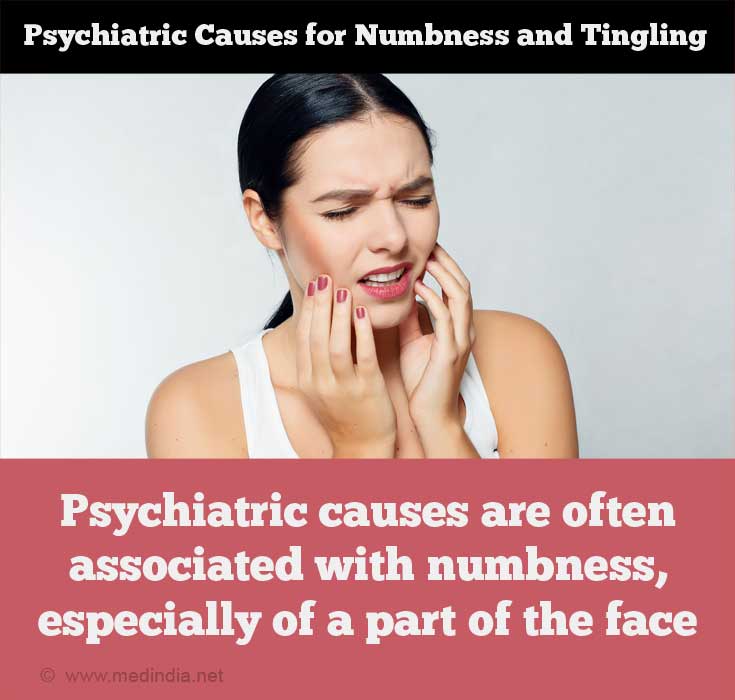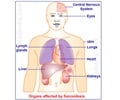- Causes of a Numb Thumb or Hand - (http://neurology.about.com/od/symptoms/a/numbness-and-tingling.htm)
- Tingling in Hands and Feet - (http://www.webmd.com/brain/tingling-in-hands-and-feet?page=2)
- Evaluation of the patient with "numbness" - (http://www.dartmouth.edu/~dons/part_2/chapter_13.html)
About
Numbness and tingling are common symptoms, which could be due to a problem in nerves, blood supply or other systemic diseases.
Numbness and tingling are abnormal sensations felt usually in the limbs. The most common reason for numbness and tingling, which has been experienced by one and all, is keeping a limb in a particular position for a prolonged period of time. This feeling, referred to as “pins and needles,” subsides on moving the limb. It occurs due to pressure on the nerves as well as reduced blood supply to the limb due to compression of blood vessels.
Some cases of numbness and tingling are due to an underlying disease, which requires treatment. The cause of numbness and tingling is diagnosed based on the history and physical examination of the patient. The doctor may also ask for certain tests depending on the possible cause.
- Causes related to peripheral nerves may be diagnosed with an electromyogram or nerve conduction study.
- A cause suspected in the brain or the spinal cord may need a CT scan or MRI.
- Blood tests may be necessary to diagnose causes like vitamin B12 deficiency. In addition, disease conditions like liver disease, kidney disease and diabetes can also be detected through blood tests.
- Examination of the CSF (the fluid that bathes the brain and the spinal cord) may be necessary to diagnose conditions like Guillain Barre Syndrome.
- A nerve biopsy may be useful to study any structural damage to the nerves.
Nerve–related Causes
Numbness and tingling are often caused due to a problem in the nerves.
The causes of numbness and tingling that involve nerves include:
- Peripheral neuropathy: Peripheral neuropathy is a condition where the peripheral nerves are affected by a disease condition. Common causes of peripheral neuropathy are:
- Herpes zoster: Herpes zoster is a viral infection of a nerve, caused by a virus called varicella zoster. Besides tingling and numbness, herpes zoster causes pain along the affected nerve. Small fluid-filled vesicles also develop along the nerve.
- Diabetes: Long-standing and uncontrolled diabetes can affect nerves, resulting in peripheral neuropathy. The patients may experience muscle weakness, pain, tingling, numbness and loss of sensation in the area of distribution of the affected nerve.
- Vitamin B12 Deficiency: Vitamin B12 is required for nerve function; hence deficiency of this vitamin affects nerve function and may result in tingling and numbness. This problem is more commonly observed in individuals on a strict vegetarian diet. Deficiency of other B vitamins can also affect nerve function to some extent.
- Use of certain medications: Medications like INH and rifampicin affect nerve function resulting in peripheral neuropathy.
- Exposure to toxic substances: Chronic exposure to toxic substances like lead, arsenic, mercury, and thallium result in damage to nerves. Besides, smoking and alcohol consumption could also affect nerves, resulting in peripheral neuropathy. Alcohol can cause direct damage as well as through a reduction of B complex group of vitamins.
- Carpal tunnel syndrome: Carpal tunnel syndrome is a condition where the nerves supplying to the hand are compressed at the wrist. Thus, the patient suffers from numbness, tingling and weakness of the muscles of the hand. Similarly, compression of the tibial nerve at the ankle results in tarsal tunnel syndrome, with similar symptoms in the feet.
- Tumors: Benign as well as malignant tumors can press on nerves resulting in tingling and numbness.
- Multiple sclerosis: Multiple sclerosis is an autoimmune condition where antibodies are produced against the covering of nerves, called the myelin sheath. The patient also shows other symptoms like loss of balance, muscle weakness, tremors, constipation, vision loss and depression.
- Seizures: A person with seizures may experience numbness and tingling. The symptoms may spread from one part of the body to the adjacent regions.
- Spinal cause: A condition that results in pressure over nerves exiting the spinal cord can result in numbness and tingling along the distribution of the nerve. For example, a herniated disc could compress on one of the spinal nerves. A neck or back injury may also compress nerves, resulting in tingling and numbness. The symptoms may increase with certain positions of the neck. A spinal cause usually results in tingling and numbness over a well-defined area.

Blood supply-related and Other Causes
Numbness and tingling could also result due to a problem with blood supply to a particular part, or a systemic disease.
Causes of numbness and tingling associated with reduced blood supply are:
- Migraine: A migraine headache is a one-sided headache caused due to alteration in blood supply to the head. The symptoms may spread from one part of the body to the adjacent regions.
- Stroke: Stroke results in reduced blood supply to a part of the brain. Consequently, the part of the body controlled by that part of the brain gets affected, often resulting in paralysis. The sensory nerves may also get affected, resulting in a feeling of numbness. In some cases, the stroke brings about temporary symptoms; this type of stroke is referred to as a transient ischemic attack.
- Raynaud’s phenomenon: Raynaud’s phenomenon is a condition where the blood vessels of the fingers and toes undergo spasm when exposed to cold or under certain emotional conditions. It commonly affects smokers and people with certain disease conditions like arthritis and frostbite. The numbness may be accompanied by pain and sometimes ulcers.
- Atherosclerosis: Atherosclerosis is a condition where the blood supply through an artery is reduced due to plaque formation. Atherosclerosis may cause tingling and numbness if the blood supply to a limb is affected, especially while walking.

Other causes of numbness and tingling are:
Systemic diseases: Other disease conditions can also result in tingling and numbness. These include:
- Kidney disorders: Kidney diseases result in high levels of metabolites like urea and abnormal levels of electrolytes like calcium, potassium, or sodium. These could give rise to a feeling of tingling and numbness.
- Liver disease: Liver disease could result in accumulation of toxic substances in the blood that affects nerve function.
- Hormonal conditions: Hormonal conditions including hypothyroidism could cause abnormal sensations.
- Other diseases like HIV/AIDS, Guillain-Barre syndrome, lupus, sarcoidosis and rheumatoid arthritis are also associated with tingling and numbness.
- Psychiatric causes: Psychiatric causes are often associated with numbness especially of a part of the face.
- Miscellaneous causes: Radiation therapy and bites from insects or animals could result in numbness and tingling. Bites may also cause additional symptoms of swelling, redness and localized pain.

Frequently Asked Questions
1. Which doctor should I visit in case I suffer from tingling and numbness?
You should visit a neurologist in case you suffer from tingling and numbness.
2. How can tingling and numbness be treated?
Tingling and numbness can be treated by identifying the underlying cause and eliminating or controlling it. For example, the blood sugar level in diabetics should be restored to normal. B complex vitamins may be administered to restore vitamin B levels. Compression on nerves may be removed.
3. Can changes in the lifestyle help in controlling tingling and numbness?
Lifestyle changes can help to prevent tingling and numbness in some cases. For this, a balanced diet should be eaten, while avoiding smoking and alcohol. Exposure to toxins should be avoided. Weight should be controlled.













